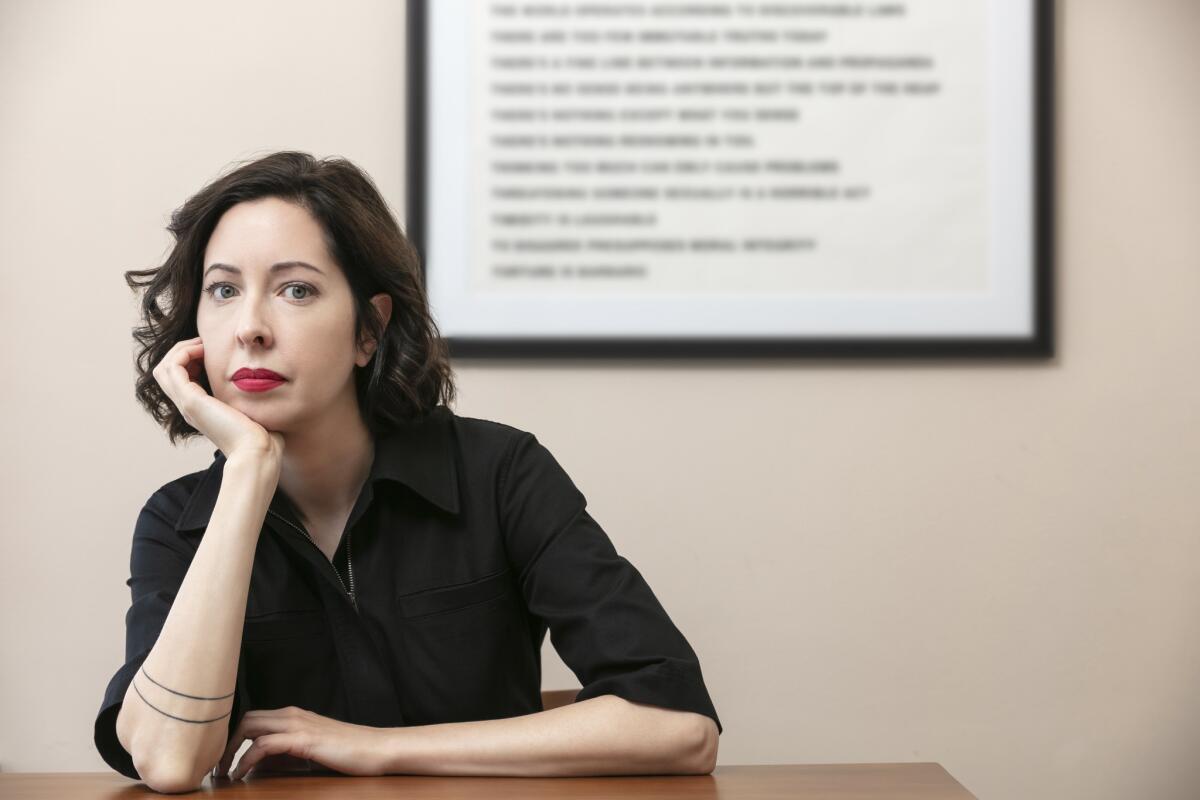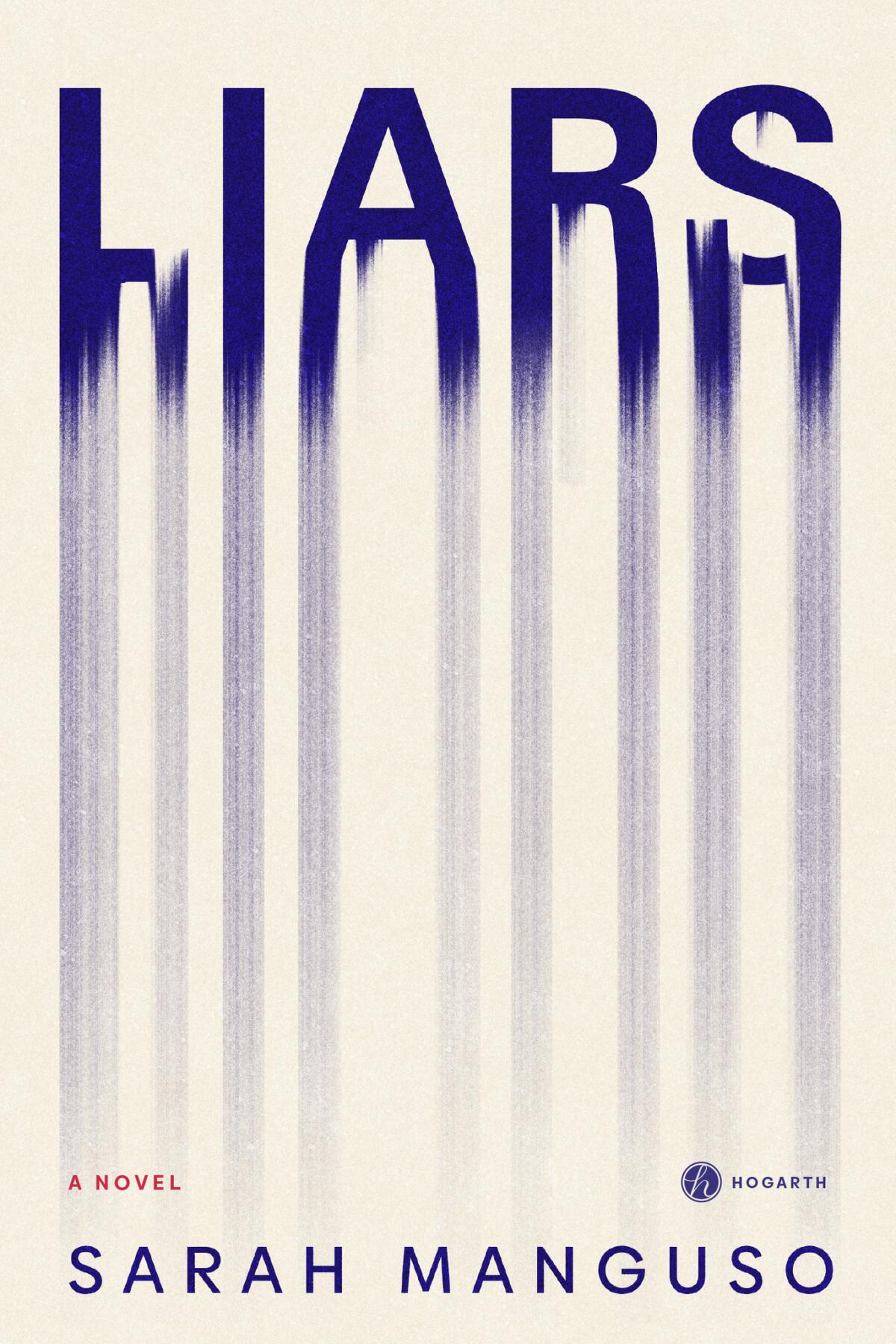
Book Review
Liars: A Novel
By Sarah Manguso
Hogarth Press; 272 pages, $28
If you buy books linked to our site, The Times may earn a commission from Bookshop.org, whose fees support independent bookstores.
“Liars,” by Sarah Manguso, seethes with rage. With a surgeon’s precision, Manguso painstakingly autopsies a couple’s unfolding — and increasingly toxic — relationship, chronicling each and every symptom of its pathology. If that sounds like a formula for an unsettling novel, you wouldn’t be wrong.
Manguso is a poet, essayist and novelist who has long probed charged topics, among them mental illness, sexual abuse, misogyny, motherhood and the predations of an autoimmune disorder. Here she has written a work of auto-fiction, apparently drawing on her own fraught marriage, which ended in divorce.
Jane is a talented writer on the cusp of success when she encounters John, an aspiring artist with charm to spare. On John’s urging, Jane applies for the same prestigious fellowship he’s hoping to win, but only Jane is admitted. She feels guilty; John wants to support Jane, but in truth, he’s bitter. Soon after he learns of her achievement, Jane tell us that John “went out and didn’t call and came home late … he said he’d gone out drinking, a phrase that repelled me. I hated the person John became when he drank.”
“Liars” is entirely narrated by Jane, whose mood and perspective shift from line to line, alternating between rationalizations of why her love for John is justified, followed by declarations of why she must leave him. Her desperation is palpable: “John woke me at two in the morning, and we fought in screaming whispers. … In the morning he left without telling me where he was going. Treading water, awaiting death — how interesting, the future had disappeared. I wondered what would happen next.”

What happens next is more of the same, on steroids. Jane and John have a child (referred to throughout as “the child”). Predictably, Jane puts much of her work on hold to take care of their son, yet still successfully publishes book after book. John, on the other hand, can’t manage to pull off the art openings he’s commissioned to stage, and he pivots to pursue a career as an entrepreneur, which necessitates frequent travel and a stomach for financial insecurity. Jane remains at home, falling deeply in love with the child while simultaneously contemplating what her life might be absent marriage and motherhood. Manguso’s reflections recall the work of Rachel Cusk, and even Virginia Woolf, who also questioned whether a woman could be happy — could survive, even — the entrapment of marriage. “I floated face down in housewifery,” Jane muses.
As has been true of previous Manguso writings, “Liars” eschews chapter separations; paragraph breaks are random. Jane’s observations appear to be those of a diarist, registering each emotion as they arise, while also charting the mundane — activities such as doing laundry or going to the bathroom.
And yet Jane is an unreliable narrator, always attempting to reconcile her husband’s bad behavior with her desire to remain with him. She lies to herself and to the reader, on one page recalling that “John still talked over me, told me my feelings were stupid, blamed our fighting on me, left the room in the middle of a conversation, and said it was a reasonable reaction to my being crazy.” Two pages later, after John returns from a visit to investors, Jane revels in her good fortune: “John came home and I couldn’t believe how lucky I was to have such a happy family.”
Anger propels this novel, and yet there are lovely moments, as when Jane marvels at the exquisite tenderness she feels for her son: “The best part of my life had been this animal intimacy, the secretion of my milk into this body…That absolute authority of which the baby must be convinced to be safe. … The honor the mother must give the baby, when the baby is ready to know that her absolute authority was never real.”
So why does Jane stay with John, even after she shares that he is irresponsible, jealous of her professional success, dismissive of her wish that he participate in household chores and child-rearing responsibilities, continually accusing her of instability? Besides the sex, which for many years is frequent and intense, Jane can’t give up the dream of a forever partner: “My god, how I’d loved thinking about our long marriage. I’d loved thinking of myself as having the capacity for mature love, which I’d experienced as self-erasure and processed as achievement.” The “ongoingness” of it all.
In recent years, it has become commonplace for writers to portray marriage — and motherhood, too — as a cross between joy and horror. There’s much horror here, minus the joy, except that Manguso is a masterful sentence writer and a brutally honest surveyor of the disadvantages women endure.
Still, the inescapable takeaway is Jane’s fury, which makes it Manguso’s too. Perhaps it is that wrath that prevents the reader from seeing John as anything but a cad, devoid of nuance or depth. Has Jane deceived herself all along into thinking John is worthy of her devotion? Or is it her sense of betrayal that causes her to see him as a monster?
By the end, we know only that Jane sees liberation in their separation: “I closed my eyes and gathered the entire marriage into a pile. It looked like a scene from a building demolition. … Then I compacted it and the pile contracted. … When I was done, it was black as coal and had the density of a collapsed star. I opened my eyes.”
Leigh Haber is a writer, editor and publishing strategist. She was director of Oprah’s Book Club and books editor for O, the Oprah Magazine.